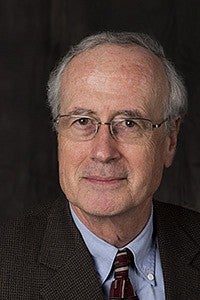
Geography
abmurphy@uoregon.edu | 541-346-4571
Courses: Geography of Europe (GEOG 202); Political Geography (GEOG 441); Geography, Law and the Environment (GEOG 463)
In my courses you will:
- Develop a significant project that will challenge you and make you proud.
- Understand what it means to be at a research university with the chance to gain new knowledge.
I was invited into the Teaching Academy because:
- I am an Ersted Award Recipient.
- I am a Herman Award Recipient.
In what ways are you working to make your teaching inclusive?
I have made changes over the years in course content to address issues and problems that I know are relevant to the lives of the range of students taking my classes. In my Political Geography class, for example, I have introduced new material on the impacts of political-territorial arrangements at the local scale, as manifest in everything from the changing configuration of electoral districts to policing practices and associated social movements (e.g., Black Lives Matter).
What do you do in terms of professional engagement with the teaching and learning culture on campus or nationally?
I am actively involved in the geography education movement. I attend sessions on issues and challenges in geography education at the annual meeting of the American Association of Geographers, and I participate in leading workshops for high school teachers who are teaching AP Human Geography. I have also contributed articles to education-related journals in my field: The Journal of Geography in Higher Education and the National Council for Geographic Education's Journal of Geography.
In what ways was your teaching in this course research-led—informed by research on how students learn and inflected by UO's research mission?
A central feature of my course, Geography, Law and the Environment, is an independent, original research project by teams of undergrads. The students in the teams pick a site in or near Eugene and look at the role law has played in shaping the long-term evolution of the landscape in the place they have chosen. They then participate in a class field trip late in the term during which the entire class visits each of the research sites and the students themselves present the results of their research--drawing on their research findings, visual aids they have prepared (maps and the like), and elements of the surrounding landscape to which the students direct our attention.
Who or what made you want to be a teacher?
My father was a university professor and I was inspired from an early age by his obvious love for what he did. He clearly derived great satisfaction from the process of sharing insights and ideas with students, opening their eyes to new things, and seeing them develop. He never pushed me to follow in his footsteps, but he set an infectious example that I'm glad I followed.
Who or what led you to this discipline?
I chose geography for several reasons. I appreciated the broad-ranging, integrative way of thinking that comes from asking thoughtful geographical questions about the world. At the same time, I was concerned about widespread geographic ignorance problem, including the tendency to reduce geography down to place-name memorization. I saw geography as a great vehicle for stimulating people's awareness and appreciation of the world around them--not just the world of images and pixels, but the tangible world. It is hard to care about another place or its people if you don't know much about it. As such, I saw geography as a way to enhance understanding and appreciation of the nature and diversity of our planet.
